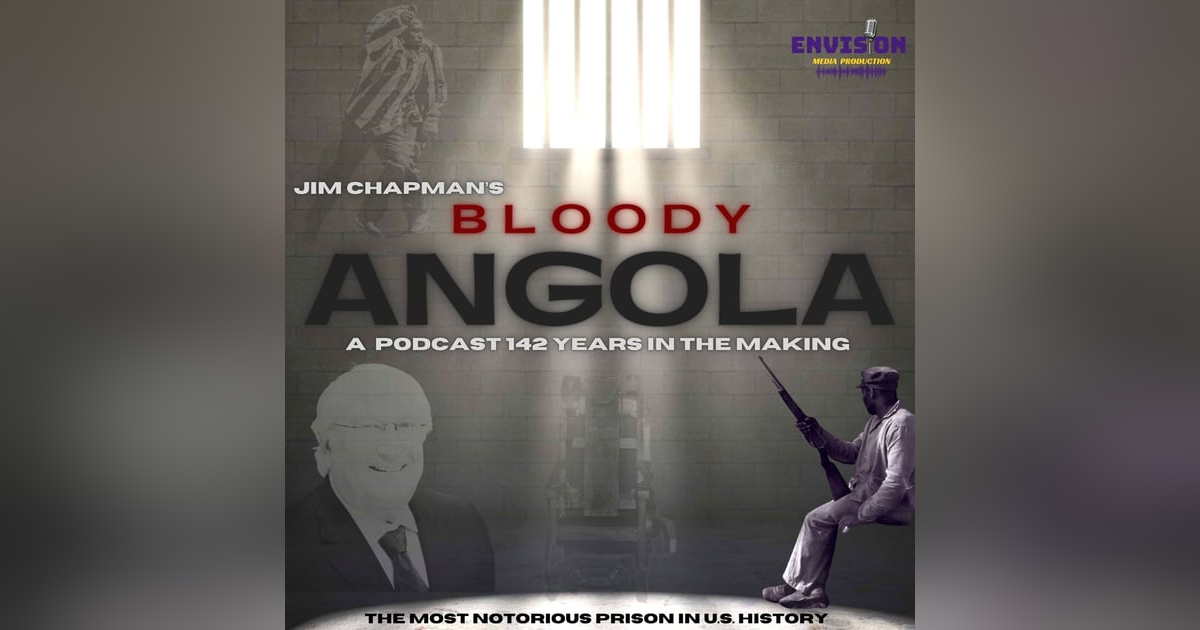Woody Overton AND Jim Chapman lay out the details when prisoners incarcerated at Louisiana State Penitentiary at Angola die.
What is the funeral procession like....Do family members claim the bodies...where and how are they buried?
Answers to all this and more on this 5th episode of Season 3 titled Dying in Prison.
#BloodyAngolaPodcast #Dyinginprison #Podcast #Podcasts #truecrime #prison #convict
FULL TRANSCRIPT:
BLOODY ANGOLA: A PODCAST BY WOODY OVERTON AND JIM CHAPMAN (DYING IN PRISON)
Jim: Hey, everyone, and welcome to Bloody-
Woody: -Angola.
Jim: A podcast 142 years in the making.
Woody: The Complete Story of America's Bloodiest Prison.
Jim: And I'm Jim Chapman.
Woody: And I'm Woody Overton.
Jim: And we're going to talk to y'all about some amazing programs that take place in Angola today. It's going to be a little different episode. No murder stuff going on today.
Woody: Right. Well, it's got a lot of death in it.
Jim: It sure does. [laughs]
Woody: Not necessarily murder. Some of them, I'm sure, were murders that occurred inside the wire.
Jim: That's a great point.
Woody: But ultimately none of us are getting out of this life alive.
Jim: That's right.
Woody: Always talk about almost 6000 inmates and how 80% of them are going to die inside the wire. Well, think about that, y'all. If you get sentenced to life Angola, let's say you're 20 years old and you're going to have family members and they care about you and love you and all that stuff. But over the years, what happens? Your mom and your daddy are going to die. Your grandparents are going to die. Your siblings are going to have lives of their own and life goes on. We've heard so many times that the inmates say everybody forgets about them. If you live another 50 years in Angola, then really you don't have anybody to care about you on the outside anymore but the people that you're locked up with basically become your family and your best friends.
Jim: That's right. A lot of these people or probably the vast majority are locked up for things that are just horrific, and you don't end up in Angola for life if you were an altar boy. In a lot of cases, family maybe turned their backs on them and was the black sheep of that family or whatever and they don't have anybody to pay those respects at the end of their life and so they get buried at Angola in the prison. We're going to go into of that information.
Point Lookout Cemetery is the prison cemetery in Angola. It's located on the north side of Angola. It's at the base of the Tunica Hills. This is obviously a situation where what we just told you about, family members are also deceased or there's just no family members that want anything to do with them.
Woody: Or maybe they don't have the financial means to come and claim the body when the inmate dies. So, they're forgotten about. But Louisiana has the highest incarceration rate of any US state and of course, sentencing is extremely harsh. But at Angola, 73% of the 6250 inmates are serving sentences of life without parole. The average sentence for the remaining 27% that aren't serving life without is still 90.9 years.
Jim: Pretty much alive.
Woody: Right. Prisoners aren't even sent to Angola unless they're sentence is over 50 years. Y'all, I believe that's more likely 80 years, like I said in the past. Basically, the result of this is with sentences of this length, most inmates lose touch with the family members and there's no one to collect the remains when they die.
Jim: This prison has been around a long time. Go back and listen to The Walls and how Angola got started, but Angola has been around forever.
Woody: 140 some years.
Jim: 142 years in the making, if you want to get specific. During that time, they did have another cemetery. Woody's going to give you a little heads-up on what happened with that.
Woody: Well, the first Angola cemetery got destroyed by a flood in 1927. Now, y'all remember, Angola is surrounded by the Mississippi River on three sides, and every few years, it grows outside of this bank and floods everything. But in 1927, when the flood happened and the water receded, the remains and caskets were found along the levee, and it was impossible to identify anyone. The bodies were reburied in a mass grave in a new cemetery called Point Lookout. It was about two acres, but it was full by the mid 1990s. It contained 331 marked graves and an unknown number of people in the mass grave. An annex, Point Lookout 2, is now in use, and it has a capacity of 700 plots. Approximately 100 of those graves now have been filled, and with the aging inmate population, it will likely max out-
Jim and Woody: Near future.
Woody: In the past, convicts were buried basically in cardboard boxes, y'all. And today, thanks to Warden Cain, the deceased are buried in coffins made at the priso...
